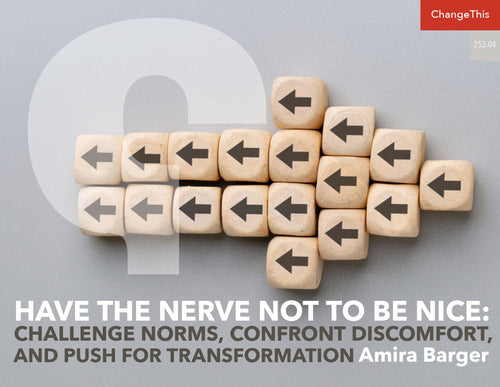Why We Need a Take Our Daughters to WORTH Day
"The Take Your Daughter To Work Day movement has succeeded. Girls today can enter any professional they choose. They can start their own businesses, advance their careers, and assume leadership roles in their organizations. We have achieved so much.
But our work is not finished. I think we have new work to do."
Twenty-five years ago I created the first Take Our Daughters to Work Day with the Ms. Foundation for Women.
Over 20 million people participated in the first three years of the movement to make girls and their ambition more visible, valued, and heard.
The tangible results of this movement were quickly obvious in increased:
- college graduation numbers for females
- Olympic medals won by women’s teams
- employment opportunities in every sector
- millions of women starting their own businesses
But, as I travel around the world today advocating for women and girls, concerned parents have alerted me to a serious speed bump in the road to a positive female future.
The steady drum beat of doubt and discrimination that women have worked so hard to combat is roaring back on social media with endless images that cause girls to question their looks and safety, deny their life purpose, and make them doubt their value.
These feelings are (unintended) consequences of technological advances in communication, commerce, and community that increase the speed and viral impact of these alarming images and messages.
The mother of two girls I met recently told me that her younger daughter voluntarily hands over her smartphone to her every night when they get home. “Too much pressure”, the mother said, “As I see it they are more and more unable to make sound choices and be confident with them. There is always a different path they could go down or a different choice shouting at them from their phones/imessages/snapchats. This affects confidence and self-worth. My daughters are always thinking they should be doing something else or could have made another choice. It creates massive FOMO (fear of missing out).”
This attack on girls’ self-esteem and the questioning of their worth and value is happening around the world and we must CHANGE THIS.
There are 1.1 billion girls brimming with talent and creativity who have the potential to shape a better world for themselves, their families, and their communities.
But their dreams and potential are being hijacked by the ubiquitous nature of social media messaging, implying you’re not good enough unless you’re wearing the right brand of clothes, going to the cool places, doing the “in” things. It is undermining girls’ self-concept and their belief that they add value as they are.
The theme for this year’s International Day of the Girl is “A Global Girl Data Movement,” and is aimed at increasing investment in collecting and analyzing girl focused and girl relevant data.
I propose that part of that data collection movement focus on the alarming fallout of the current messaging on digital devices and social media that is negatively impacting their health, relationships, self-concept, the perception of their usefulness to society.
Here are just a few of the shocking statistics that bring home the adverse effect of the current conditioning on our daughters, sisters, nieces, and granddaughters.
Did you know?
- The suicide rate is at a 40 year high for girls ages 15-19. It has doubled in recent years compared to data prior to 2015, according to the US Center for Disease Control.
- 70% of girls aged 11-21 say sexism is so widespread (online and off) it affects most areas of their lives, according to UK Girl Guiding Attitude Survey 2016.
- “The more time teens spend looking at screens, the more likely they are to report symptoms of depression.” —The Atlantic, “Has the Smartphone Destroyed a Generation?” by Jean M. Twenge.
- 69% of girls ages 7-21 feel they are not good enough, according to UK Girl Guiding Attitude Survey 2016
Perhaps one of the most poignant examples of how girls are being harmed by the prevailing tone of social media is given by Olivia Vella, at Queens Creek Middle Schooler who read her end of the year poem to her 7th grade writing class called “Why am I not good enough.” Railing against the drive to conform to fashion and behavior dictated by “mean girls” let loose on social media, Olivia explains feeling the intense social pressure to wear makeup, provocative clothes, and uncomfortable shoes and do skanky things with boys just to be accepted. She struggles mightily with how she looks all the while sort of knowing that her looks are not what define her.
The only place she felt comfortable and confident was doing her school work well—and the “in” crowd on social media made fun of students for that, too.
Over 20 million people have watched Olivia’s video on Facebook proving that she is not alone in feeling like she is not good enough.
This is NOT what we envisioned when we launched Take Our Daughters To Work Day. This is NOT why millions of people have participated in Take Daughters to Work Day year after year.
That movement has succeeded. Girls today can enter any professional they choose. They can start their own businesses, advance their careers, and assume leadership roles in their organizations. We have achieved so much.
But our work is not finished. I think we have new work to do.
It is not an option to stand by passively as the first generation of digital native girls comes of age and struggles—feeling isolated, unworthy, under pressure, and filled with doubt.
That is why I propose we update the Take Our Daughters to Work movement with a Take Our Daughters to WORTH Day.
Let’s not give another inch to the conscious and unconscious forces that are making our daughters, nieces, and granddaughters feel they are not good enough.
Let’s not watch as talented, smart, kind girls are made to feel miserable because they cannot compete with the Kardashians.
Those who have participated in and who have benefitted from Take Our Daughters to Work can’t be thwarted by the “like and don’t like” culture that is draping the next generation in doubt, dread, and the never ending, futile quest for perfection.
It doesn’t have to be this way. There is a better way. We can counter the consequences of online body shaming, pornography, trolls, and bullies. As successful as Take Our Daughter to Work Day was in helping girls, parents, teachers, and employers see the value of young woman at work, we now need to focus on changing the definition of worth and self-worth so girls can embrace their value in every facet of their lives.
We need to help girls understand that their value—their worth—is not defined by her shape, size, or color, by what she wears or what she weighs, or by where she lives.
We need to model, teach, and show young girls that a person’s worth is defined by what she does, who and what she cares about in the world, how she contributes and how she treats herself and others.
The word “worth” when used as a noun means, “excellence of character or quality as commanding esteem: as in women of worth.”
I envision a Take Our Daughters to Worth Day where girls are given opportunities to meet, talk with, and learn from women role models who share how they discovered their worth, fought for and spoke up for their worth, and how they show and share their value.
Girls can become women of worth and believe that they are good enough. We can borrow traditions from the past and from other cultures and combine them with new wisdom to put girls and boys on the path to feeling good enough, to believing they have value and an important role in society, and to being everything they want to be.
Carol Beckwith and Angela Fisher, world renowned photographers who document African ceremonies, recently told me about a traditional female initiation ceremony.
They explained, “The Krobo girls in the villages of Southeastern Ghana when they start their periods were assigned to a ritual mother (not their birth mother) to learn all the secrets and the ways of being a woman in a three week ceremony. The girls are taught everything from cooking and washing, to how to dress, dance, paint their bodies, wear traditional beads, take care of a child, and how to please a man. There is a joyous graduation at the end where the girls are celebrated for their role in the community and entry into womanhood.”
You could see their joy and delight as they describe the joy and delight on the girl’s faces as they emerged from their initiation.
The daughter of the Krobo Chief, an Oxford graduate, who participated in this initiation said, “I would give up college education if I had to choose between the initiation ceremonies and college.
When asked, “why?” she said it was because… “it taught me about being a woman and moving into adulthood”
When I repeated the story a few days later to a young English woman she burst into tears saying, “I want to experience that kind of ceremony and learn those lessons too.”
Imagine a world where Olivia Vella in the video and all our daughters are pleased to be who they are, able to honor past traditions, and prepared for the future. It starts with Take Our Daughters to Worth Day. It starts with creating an annual tradition where generations of women gather to pass along their stories, insights, and recommendations about how to show up in the world as a person of value who has something important to contribute—an annual tradition where we show girls that we are their allies and advocates.
Millennia ago, when gender roles were defined by men hunting and protecting the village and women’s lives were defined by growing food, making a home and raising children, the initiation worked for girls and the community. But now the Krobo people have shortened their initiation from 3 weeks to 3 days. They decided girls needed more time for school and college in order to get a good job.
I’m not even suggested that our ceremony take three days. I’m suggesting one day. ONE DAY where we invest in our future generations and prepare them to be a contributing member of society by passing along the wisdom of their mothers, daughters, aunties, grandmothers, and women leaders.
Surely we can set aside this time to counteract the thousands of hours conditioning your girls to value makeup, brand clothing, shopping, and gossip.
While we may have less time for transitions from one stage of life to another, maybe it can’t all be boiled down to a 13 second video or commercial. Look at the amount of video being consumed, in some cases by our children, to learn about sex, love, and how to use make-up as they enter adulthood.
- YouTube makeup tutorial video vloggers reached 700 million hits a month, with skin, nail care, and weight loss not far behind them
- 92 billion pornography videos were viewed in 2015. —Porn Hub Year in Review 2016
- The average age children first see pornography online is age 8.
Girls are struggling to become women and being challenged at every turn by a deluge of confusing, comparing, and conflicting images on social media and the ongoing unrealistic representation and expectations set in advertising, movies, and TV that is making their heads spin.
One promising development in this onslaught of confusing images is a partnership between The Female Lead, a campaign founded by data entrepreneur Edwina Dunn, pioneer of the supermarket loyalty cards and Sunday Times Style, which I am proudly apart of in The Female Lead book and Icon video series.
“Thanks to groundbreaking research done for Style by Dunn’s data science company, Starcount, it turns out that screen time can be harnessed in positive ways to motivate our daughters. Teenage girls who track two or more female role models on social media… are three times more likely to use the word ‘aspire’ and four times more likely to describe themselves as ‘feminist.’ What’s more, there’s a visible progression to this positive influence. Women in their twenties who follow two or more female role models are 16 times more likely to use words like ‘director’ in their profile and six times more likely to use ‘campaigner.’ You get the picture: social media can present girls with female role models that change their leadership aspirations.” —The Sunday Times Style, “How to Raise a Female Leader” by Fleur Britten, September 17, 2017
I propose we host Take Our Daughters to WORTH day in cinemas, much like the TED cinema experience. It will break the isolation we all feel as we experience too much of our world through a private screen.
“Our hope is that we can use this technology to push the boundaries of how we identify the representation imbalance in media. Media that is more representative of our society not only fosters a more inclusive industry, but by increasing the number and diversity of female leaders and role models on screens, content creators are affecting the ambitions and career aspirations of young girls and young women everywhere. If she can see it, she can be it.” Geena Davis, actor, founder of See Jane and the GD-IQ (Geena Davis Inclusion Quotient)
Take Our Daughters to Worth Day will stop our girls’ heads spinning and call on the wisdom of girls and adults to chart a path for digital natives that will ground them in their worth.
Smart phones, tablets, and mirrors will not be allowed for the day.
Girls will experience a live interactive program that confirms they are good enough. Role models will play an important part in the day at every theater.
Like Take Our Daughters to Work Day, we will be reaching out to girls, parents, teachers, and CEOs who want to help girls see their worth as they move toward to womanhood, livelihood, and love.
On Take Our Daughters to Worth Day we celebrate girls exactly as they are. Girls are being instructed and prepared to make choices. Not preparing to be chosen but preparing to choose what is best for them.
The celebration and instructions will be about their intellectual, emotional, physical, and spiritual power. Girls will express themselves by doing, showing, and sharing their accomplishments, challenges, hopes, and fears. They will see themselves in the faces of each other and appreciate differences by the curiosity expressed.
On Take Our Daughters to WORTH, Day girls ages 8-14 will fill the seats along with their mothers, teachers, aunties, and fathers to watch, speak, connect, learn, and navigate their path to womanhood. Topics covered will include:
- Connecting girls to each other and across the generations with images, activities, and music that makes girls feel good enough, empowered, and prepared for tomorrow.
- Learning live proven problem solving techniques for handling bullying, sexism, and harassment online and in person.
- Practicing speaking about what you are best at and the problem(s) you want to solve in the world.
- Interviewing and talking with role models
- Role playing making choices, learning the power of trusting gut instincts and making mistakes
- Creating together the Digital Daughters Roadmap to Self-Worth
- Designing processes to transform environments and cultures to embrace and welcome young women and girls. (Such as making STEM jobs and work environments work for young women and girls)
Now imagine generations of girls prepared for the future by women and men who know their worth and who fought for the rights of girls and women to make choices and be for themselves as leaders in their own lives and the world.
About the Author
Nell Merlino is a leading activists and advocate for women and girls. She has mobilized millions of people through the creation of Take Our Daughters to Work Day and the founding of Count Me In for Women’s Economic Independence and Make Mine a Million $ Business to advance the cause of female equality. Nell served as a Pathways Envoy for the U.S. State Department promoting women’s entrepreneurship across Central America and served on the development committee for the Walmart Women’s Economic Empowerment program. Nell provides commentary to major news outlet in the U.S. and most recently the UK and has generated over 2 billion media mentions focused on the progress of women and girls. She is the author of Stepping Out of Line: Lessons for Women Who Want it Their Way in Life, in Love, and at Work.












































